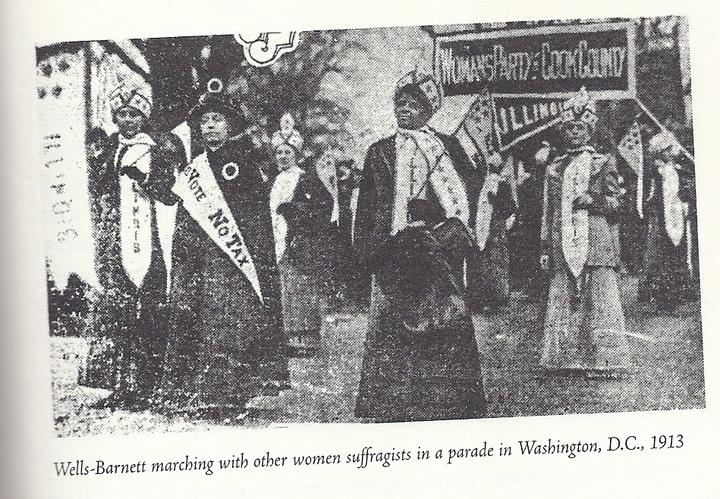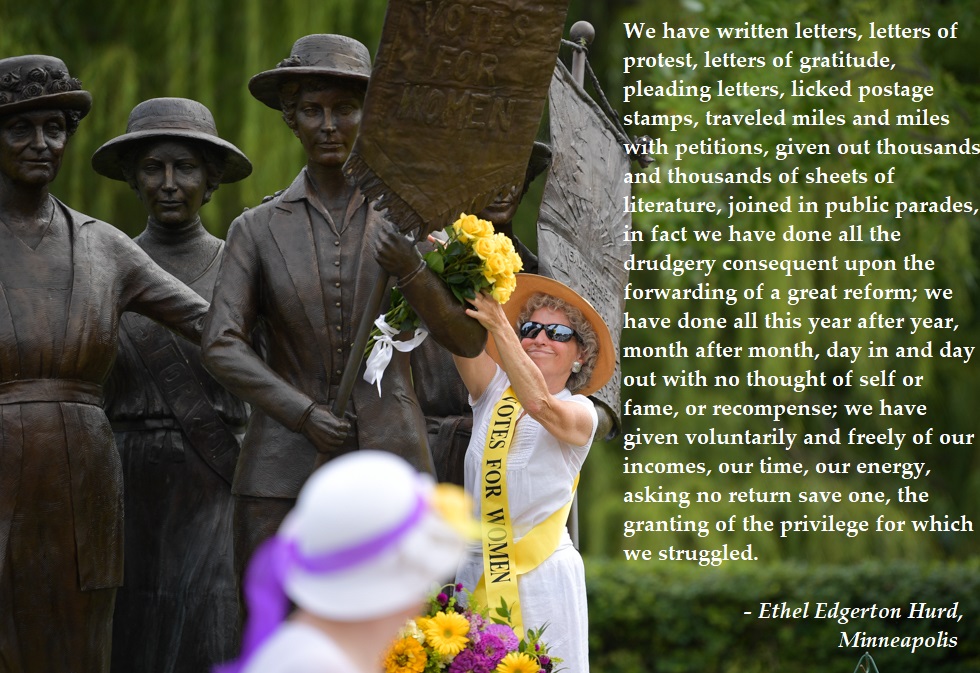Skip to the Pledge
August 2020 marks the 100th anniversary of the landmark 19th Amendment which prohibits the federal government and any state from denying citizens their right to vote on account of sex.
First introduced in 1878, the 19th Amendment was signed into law August 26, 1920 after Congress and 36 states ratified it.
This historic victory was the culmination of 72 years of tireless agitation by three generations of women, who, at great personal cost, campaigned for enfranchisement. Satirized, ridiculed, heckled, humiliated, jailed, beaten, and force-fed, suffragists continued to organize, strategize, speak out, picket, petition, travel, and march, determined in their doggedness to win voting rights for women, despite suffering setbacks and disappointment. We pay special tribute to all suffragists for their tenacity and resilience.

However, this triumph came at a cost. By 1870 suffrage leaders were embittered that women had not been included when African American men gained the right to vote. Subsequently, to win suffrage for themselves, they engaged in a strategy based upon racist ideologies that incited racial animosity. They were complicit in ostracizing and marginalizing African American suffragists who had worked with them on the forefront of the struggle to secure voting rights since the 1800s. In making this conscious decision to exclude black women, white suffragists not only disregarded the contributions and sacrifices of African American women to the movement, but left behind an incomplete legacy, one of racial segregation.
While the 19th Amendment legally gave women the right to vote and African Americans and Latinx Americans began to exercise this new right, the Constitution left the details of voting to individual states rather than the federal government. To discourage people of color from voting, many states began adding restrictive laws and discriminatory policies. These included poll taxes, literacy tests, voter identification, property ownership requirements, English-only elections, inaccessible polling locations, intimidation, and violence.
Native Americans and Asian Americans were disenfranchised by denial of citizenship. In 1924, Congress granted Native Americans the right to citizenship and the vote through the Indian Citizenship Act or Snyder Act but it was not until 1962 that all states extended suffrage to Native Americans. As immigrants, Asian Americans were prohibited from becoming U.S. citizens for centuries. Gradual changes came about with citizenship to Filipino American men in 1925, Chinese Americans in 1943, and to all Asian Americans with the passage of the McCarran-Walter Act in 1952. These groups also experienced the same voter suppression challenges at the ballot box to keep them from voting.
Finally, in 1965, the federal Voting Rights Act (VRA) prohibited any election practice that denied the right to vote on account of race and permanently removed all barriers to voting for African Americans, Native Americans, Latinx Americans, and Asian Americans. For people with disabilities, the Americans with Disabilities Act and Help America Vote Act of 2002 required voting facilities and systems be accessible.

However… The Fight Continues
One hundred years later…
While Vermont is a leader for voting rights, in 2013, the Supreme Court struck down crucial provisions of the VRA that protected voters. As a result, 25 states have enacted voter suppression laws restricting access to the polls, which disproportionately affects people of color.
- Strict Voter Identification requirements
- Voter Roll purges
- Limited early voting opportunities
- Fewer polling locations and long lines
- Shorter hours at polls
- Harassment
- Malfunctioning equipment
- Gerrymandering
We Support the Vermont Approach
Vermont Makes Voting Easy and Accessible.
- Automatic voter registration
- Election day registration
- Online voter registration
- Voter registration if you are 17 years old and will be 18 by the general election
- Ability to vote in a primary election at 17 if you will be 18 years by the general election
- Online early or absentee ballot request
- No-excuse 45 day early voting periods
- Right to vote if you are or have been incarcerated
- Right to vote if you are homeless
- Accessible ADA-approved, universal design voting system
- Safe at Home, Address Confidentiality Program for survivors of domestic violence and sexual assault
- Home delivery ballot if you are sick on election day or have a disability
- Secure election cybersecurity protections
Sign the Pledge
I support Vermont’s approach to making voting easy and accessible, and I pledge to:
- Register to vote
- Exercise my right to vote in local, state, and national elections
- Find out my polling location and hours of operation
- Request and complete Early or Absentee ballots if I am away from home or unable to go to my polling station
- Be thoroughly informed about the issues
I support the rights of all citizens of the United States to have access to exercise their right to vote.
Your privacy is very important to us! We will never sell or share your information with a third party. If you leave comments for us, we may use your quote—but we will not include your name or identifying information.
Thank You For Taking The Pledge!
